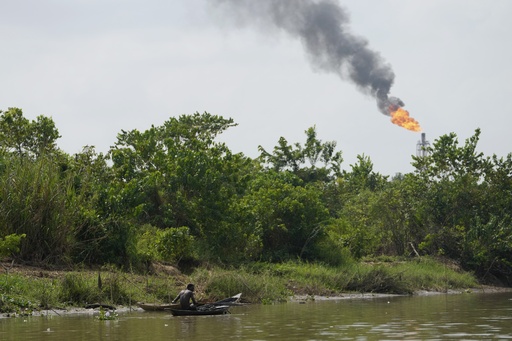ABUJA, Nigeria — The Nigerian government is currently engaging in discussions with local communities to revive oil production in an area known for its previous environmental degradation, following Shell’s recent divestiture from its onshore operations in the country.
Shell’s decision to sell its onshore business for $2.4 billion to a consortium of local firms was confirmed last week by Olu Verheijen, who serves as the special advisor to the president on energy matters. This marks a significant shift, ending nearly a century of Shell’s operations in the onshore Niger Delta, an area that has been plagued by continuous complaints regarding environmental pollution.
Government officials have identified the Ogoniland region in southern Nigeria, where Shell ceased its operations in 1993 due to violent protests alleging extensive environmental harm and human rights violations, as a key opportunity for revitalizing oil production. This move aims to bolster the nation’s foreign exchange revenues. “There is a general agreement in Ogoni regarding the resumption of production,” remarked Ledum Mitee, a long-time environmental advocate and former leader of the Movement for the Survival of Ogoni People.
Western oil firms, including ExxonMobil, Eni, Equinor, and TotalEnergies, are increasingly withdrawing from Nigeria, with a marked shift toward offshore operations. This retreat is largely driven by the adverse impacts of oil spills on local waterways and agricultural land, which have aggravated long-standing tensions in a region plagued by militant activity.
Shell’s sale faced delays as community protests and activist organizations, including Amnesty International and the Dutch non-profit SOMO, called for an immediate cleanup of affected areas. While the specifics of the agreement regarding Shell’s environmental responsibilities remain undisclosed, Isaac Botti from Social Action, a Nigerian group that protested the sale, stated that his organization sought details on the deal between the Nigerian Upstream Petroleum Regulatory Commission and Shell, as well as the new owners, Renaissance Africa Energy Company. The regulatory body has not provided any comments on the matter.
Shell previously indicated that the transaction is structured to ensure its continuing role in managing remediation efforts related to any spills resulting from its past operations in the region.
Environmental concerns continue to loom large, with scientific research highlighting elevated levels of harmful chemicals and heavy metals in the delta. While oil production is vital to Nigeria’s economy, it has severely compromised the safety of local water supplies, often contaminated by oil byproducts.
According to documents from the United Nations, a cleanup initiative in Ogoniland, supervised by the UN Environment Programme and largely funded by Shell, has been mismanaged. Activists are advocating for increased dialogue before any resumption of oil production occurs. Mitee praised the president’s decision to foster consultations regarding local terms and conditions instead of imposing top-down solutions.



